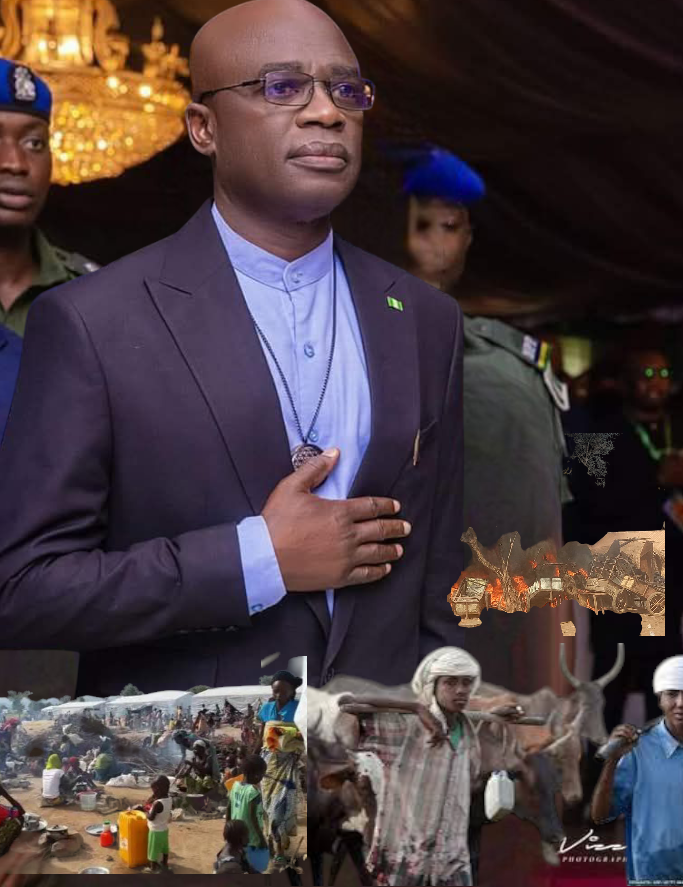BENUE LIVES MATTER
*Government Silence in the Face of Adversity: A Dereliction of Duty and Betrayal of Public Trust
*#Justice4Ojantele, Naka, and Across the Three Zones
By Morgan Adikwu
The escalating violence in Benue State, marked by relentless attacks from Fulani herdsmen, has cast a dark shadow over the region. Governor Hyacinth Alia’s conspicuous silence and perceived inaction have ignited widespread condemnation, with many accusing him of compromising his people’s safety to curry favor with the Fulani political oligarchy.
In March 2024, during a visit to Sokoto, Governor Alia stood alongside the Sultan of Sokoto, Muhammad Sa’ad Abubakar, who unabashedly labeled the Benue people as cattle thieves. Instead of defending the people he is serving against such sweeping accusations, Alia addressed the Sultan as “my daddy,” a gesture many interpreted as a submissive alignment with external interests over his people’s welfare.
The governor’s reluctance to challenge these defamatory remarks has been perceived as a tacit endorsement, emboldening aggressors and deepening the community’s sense of abandonment. This perceived betrayal is further exacerbated by the alarming statistics: over 3,000 Benue residents have been killed under Alia’s administration, with numerous attacks leaving communities devastated and survivors traumatized.
The atrocities committed by Fulani herdsmen have left an indelible scar on Benue’s landscape. From the massacre of 11 individuals in Anwase, Kwande LGA, on Christmas Day 2024, the carnage in Otukpo and it’s environs to the displacement of millions, the human toll is staggering. Communities like Ojantele, Edikwu, Kwande, Sankara, Okpomaju, Odugbo, Naka etc, spanning the state’s three senatorial zones, have become synonymous with grief and resilience.
However, Alia’s response has been widely criticized as inadequate. While he announced plans in May 2024 to launch a state security outfit, the Benue State Civil Protection Guards, this initiative was perceived by many as a superficial attempt to placate public outcry rather than a genuine strategy to combat the escalating violence. Critics argue that such measures have been more about political grandstanding than addressing the root causes of the insecurity.
The government’s inertia has not only allowed these atrocities to persist but has also led to misplaced channels of grievance among the populace. In Gwer West Local Government Area, for instance, aggrieved youths, frustrated by the incessant killings, resorted to violence. They set ablaze the local government secretariat and the palace of the traditional ruler, Ter Nagi, Chief Daniel Abomtse, causing extensive damage to properties. Such actions, while born out of genuine anger and frustration, further destabilize the region and divert attention from the root causes of the crisis.
Similarly, in Apa, the Odejor K’ Apa, the longest-serving chief of over 42 years, faced unfounded accusations from concerned groups. They erroneously alleged his involvement in the charges against the Ojantele chief, and called for the withdrawal, showcasing a troubling trend where local leaders are scapegoated for systemic failures.
These misdirected grievances underscore the urgent need for citizens to channel their demands appropriately, targeting those in positions of actual authority and decision-making, such as local council Chairman, Divisional Police Headquarters in the LGAs, The Tiv and Idoma Traditional Council, Bureau of Local government and Chieftaincy and even the office of the Governor.
Henceforth , the people of Benue must unite, organizing peaceful protests and leveraging platforms to demand accountability and immediate action from their leaders. While journalists and media houses should intensify investigative reporting, shedding light on governmental negligence and the true extent of the atrocities, thereby mobilizing national and international support.
Also, Opposition parties, civil society organizations, and influential stakeholders need to exert sustained pressure on the current administration, ensuring that the plight of Benue’s citizens remains at the forefront of political discourse. Grassroots initiatives that promote dialogue, reconciliation, and collaboration among diverse ethnic groups can help rebuild trust and foster a united front against external aggressors.
Governor Alia’s current trajectory, marked by perceived indifference and allegiance to external powers, poses a grave threat to Benue’s future. It is imperative for the governor to realign his priorities, placing the safety, dignity, and prosperity of his people above all else. The time for decisive leadership is now; the people of Benue can no longer afford to be sacrificial pawns in a game of political chess.
#BenueLiveMatter
